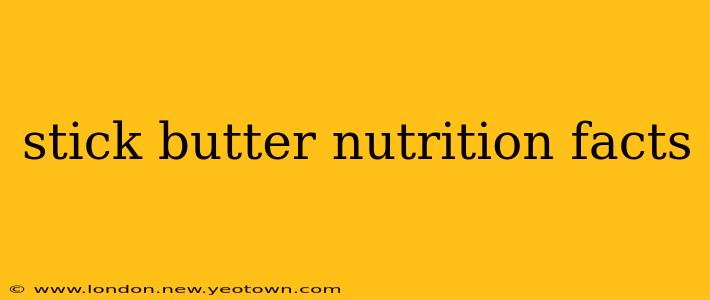Butter, that golden delight spread across toast or melting into a rich sauce, has been a culinary staple for centuries. But beyond its deliciousness, what are the real nutritional facts behind a stick of butter? Let's unravel the creamy truth, exploring its composition, potential benefits, and things to keep in mind regarding its place in a balanced diet.
What is the Nutritional Content of a Stick of Butter?
A standard stick of salted butter (1/2 cup or 113 grams) typically contains approximately:
- Calories: 810-820
- Total Fat: 91-92 grams (saturated fat: 58-60 grams, monounsaturated fat: 21-22 grams, polyunsaturated fat: 3-4 grams)
- Cholesterol: 215-220 mg
- Sodium: 300-500 mg (depending on whether it's salted or unsalted)
- Other Nutrients: Trace amounts of vitamins A, E, and K, and minerals like calcium and phosphorus.
It's crucial to remember these numbers are averages, and slight variations might occur depending on the brand and the type of butter (e.g., grass-fed versus conventionally produced).
Is Butter High in Cholesterol? Should I Be Worried?
Yes, butter is relatively high in cholesterol. However, the modern understanding of dietary cholesterol and its impact on blood cholesterol levels is more nuanced than it used to be. While dietary cholesterol does contribute to blood cholesterol, the impact varies significantly from person to person. For many individuals, dietary cholesterol's effect is less impactful than previously thought, with saturated fat intake playing a more significant role in raising LDL ("bad") cholesterol.
How Much Saturated Fat is in a Stick of Butter?
Butter is predominantly composed of saturated fat. A single stick contains a substantial amount of saturated fat, which has historically been linked to an increased risk of heart disease. However, recent research is less conclusive, suggesting that the relationship between saturated fat and heart disease might be more complex than previously believed. Moderation remains key.
What are the Benefits of Eating Butter?
Despite its high fat content, butter offers some potential benefits:
- Source of Fat-Soluble Vitamins: Butter contains vitamins A, E, and K, which are essential for various bodily functions.
- Flavor and Culinary Versatility: Butter significantly enhances the flavor and texture of numerous dishes, from baking to sautéing.
- Potential Source of Conjugated Linoleic Acid (CLA): Some studies suggest that butter, particularly from grass-fed cows, might contain CLA, an omega-6 fatty acid linked to potential health benefits (though more research is needed).
Is Butter Bad for You?
Whether or not butter is "bad" for you depends largely on individual factors, overall dietary habits, and the quantity consumed. While it provides essential nutrients and adds flavor, its high saturated fat and cholesterol content make moderation crucial for most people. Including it as part of a balanced diet, rather than consuming large quantities regularly, is generally recommended.
Can I Substitute Butter with Something Healthier?
Numerous alternatives to butter exist, each with its own nutritional profile and culinary applications. Options include olive oil, avocado oil, coconut oil, and various nut butters. These alternatives often offer different ratios of saturated, monounsaturated, and polyunsaturated fats, along with varying levels of vitamins, minerals, and other beneficial compounds. The best substitute depends on individual needs and culinary preferences. However, remember that many alternatives also have significant calorie counts, so mindful portion control is crucial regardless of choice.

